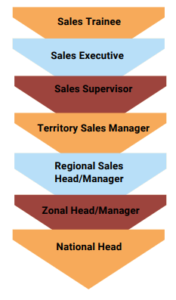Introduction to Sales
Introduction to Sales
- Inside Sales
When sales teams engage with their prospects and customers remotely, often from their office, they follow an inside sales approach. This means they are selling from within their company. The company’s inside sales persons contact leads and prospects to complete the traditional sales process — uncovering the customers’ needs, matching them with the right solution, and closing the deal. - Outside Sales
On teams where salespeople visit and broker face-to-face deals with the prospect, they are following an outside sales approach. This implies that they are selling from outside their company. These teams tend to not have strictly regimented processes, allowing freedom and flexibility for the sales persons to develop and implement their own sales strategies. - B2B Sales
This common acronym stands for “business-to-business” and describes companies that sell products and services to other businesses, instead of individual consumers. B2B sales tend to have a higher sales value and more complex terms because the goods sold to other businesses typically play an essential role in how the buyer’s business operates. - B2C Sales
Unlike B2B sales, B2C (or business-to-consumer) sales revolve around transactions between a company and its individual consumers. These deals tend to be of lower price-value and complexity than B2B sales and can involve multiple deals with a variety of customers. - Business Development
Sales Though business development doesn’t account for an entire sales transaction, it’s an important aspect of the sales function for many companies. This role is typically held by business development managers, who are responsible for generating new business and qualifying leads for their company. Once the business development managers have qualified the new leads, their sales persons can take the leads through the sales process to close the deal. - Agency Sales
This type of sales involves generating and converting new leads to sign onto service packages from an agency. In the agency sales space, clients are typically signed either by project or on a retainer. For agencies that sign clients by project, they primarily focus on bringing in new business, selling service packages to new clients as their current projects wrap up. With a retainer model, agencies can engage with clients on an ongoing basis which allows for predictable recurring income with less dependence on bringing in a steady stream of new customers. - Consultative Sales
Consultative selling is a style of selling that focuses on building trust with the customer to understand their needs before recommending a specific product or service. With consultative selling, sales reps focus on building a relationship with the buyer and leading the sale with how the offering will benefit the individual customer, instead of solely focusing on the features of the product to make the sale. - Direct Sales
With a direct selling model, individual salespersons are able to sell directly to consumers outside of a traditional retail environment. With this method, sellers conduct the sale oneon-one with their customers, often earning a commission. - Account Based
Sales Businesses that have large enterprise accounts with several points of contact look to account based sales to serve these customers. Unlike business development sales, account-based sales teams don’t handoff their opportunities to a sales person to close. Instead, the opportunity stays within the account-based team to serve that customer from lead to opportunity and all the way through to customer success. - eCommerce Sales
Does your organisation sell products exclusively online? Is your customer able to research your product, determine whether they want to buy it, and make their purchase online all without needing to engage with someone from your company? If so, you’re following an eCommerce sales model.
Thus, by selecting the appropriate sales approaches the organisation can sell its products and services and grow its revenue. And the sales executive is the person who is responsible for making the sales transactions happen with the buyer on behalf of the person or the organisation he or she represents.
The sales executive is almost the entry-level position of the sales function. His/her responsibilities are:

- Proactively identify sales prospects in the assigned territory for generating business.
- Follow up on new leads and referrals to generate business.
- Demonstrating and presenting products.
- Negotiating contracts and packages.
- Build and maintain relationships with clients and prospects.
- Attending trade exhibitions, conferences and meetings on behalf of the company.
- Build and maintain professional networks.
- Achieving the monthly/quarterly/annual sales targets, assigned to him/her, for various products and services.
- Ensure customer satisfaction through regular engagement.
- Resolve customer queries/issues and facilitate customer service.
- Maintain periodic status reports, including daily activity report and calls/follow-ups made.
To be able to successful in the field of selling, the sales executive needs to possess the following competencies:
- Have a clear understanding of each step of the sales process used by the organization to convert leads into customers.
- Be able to communicate effectively in a variety of scenarios using a variety of media in an engaging, empathetic, people-focused way.
- Have a sense of curiosity and willingness to learn.
- Be a creative problem solver.
- Have solid negotiation skills.
- Be able to quickly build relationships with people inside and outside the organisation.
- Must be ambitious and results-driven.
| Education Pathway | ||
|---|---|---|
| Undergraduate | Post-Graduate | Some Colleges |
|
BBA BBA (Sales and Marketing) |
MBA MBA (Sales & Marketing) |
|



